Having spent Ramaḍān 1987 in Portugal with Mawlānā Us̱mān, I was blessed with the opportunity to lead Tarāwīh in Portela again. This time, my companion was Ḥāfiẓ Rizvān Patel, another very close friend.
This time we were hosted by Hāji IsmāꜤīl Baghat and his family, a fabulous couple who looked after us so well. Khala was a Khatri, whose cooking was spectacular. It was very nice to meet up with friends made during the previous visit. The ꜤIbādat Khānā was located in the very same place.
Ramaḍān went very smoothly and towards the end, we expressed our desire of visiting Spain, especially the city of Córdoba. Our friend Us̱mān took care of all the arrangements and extended our tickets so that we could go over to Spain for 3 days, after ꜤEid in Portugal.
This was an incredible journey, certainly not for the lighthearted! We boarded a coach in Lisbon at 9am, headed for Seville in Spain. After some 8 hours of travelling with fellow passengers who couldn’t speak English, the coach driver stopped outside a railway station in Seville and signalled to us to leave the coach.
He couldn’t speak much English either, so employing some sign language, gestures and some broken English, he tried to convey instructions to get the train to Córdoba, and back to the same spot two days later at 10am. This wasn’t so difficult to understand because Us̱mān had explained all this to us before we boarded the bus.
So there we were, two strangers in the historic city of Seville at 5pm on a summer’s afternoon. We went into a nearby supermarket to see if we could find any Muslims, but had no luck, so we made our way back to the train station and bought tickets for the next train to Córdoba. This train arrived shortly and two hours later, we were breathing the air of Córdoba – a striking city.
They were long summer days and although it was close to 8pm, there was still light and sunset, an hour away. As we walked the wide streets of Córdoba, we hadn’t a clue of where we were going and where we would spend the night. Seeing signs saying ‘Mezquita’, we followed the arrows knowing that this would lead us to the Grand Masjid of Córdoba.
There were many street sellers, many of them Muslims, who were now packing up, ready to leave for the day. As we walked a little further, a voice called out, ‘السلام عليكم’ clearly, to which we responded. It was incredible, truly amazing; here was a Muslim brother (Arab or Pākistānī origin) who greeted us as if he was awaiting our arrival.
He said he had been watching us walk down the street and guessed that we were visitors to Córdoba. Indeed this was a blessing. He was just closing his shop and he directed us to a nearby park saying that there was a Masjid there, in which we would be able to pray our Maghrib and ꜤIshā and from there, make preparations for night stay.
We heartily thanked this brother and, following his directions, found ourselves in a beautiful park surrounded by greenery. We looked around for a Masjid and right there, shining in the centre of the park, was a small white domed Masjid, سُبْحَانَ الله. We were most delighted.
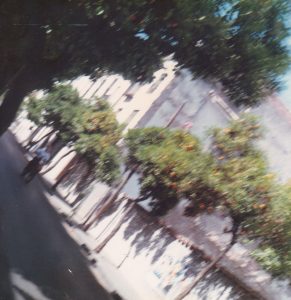
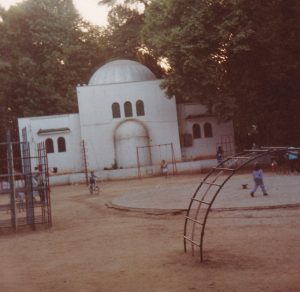
As we approached the main door of Mosquée al-Morābiṭine, a Muslim of Pākistānī origin welcomed us and exclaimed to some Brothers standing nearby ‘Here come some guests.’ We said our Salāms and quickly caught up on our Ṣalāhs. After Maghrib, the Muazzin of the Masjid handed us the keys to the main door. مَا شَآءَ الله, we were welcome to spend the night in the Masjid, اللّٰهُ أَكْبَر.
We met with the Imām and the Musallīs, who were mainly of Arab or Pākistānī origin. The feelings of brotherhood were remarkable; two foreigners made to feel at home within minutes. After having some food and praying ꜤIshā, we laid to rest, having made it to Córdoba! Being all alone in a Masjid all night in the middle of a park in Córdoba was not very easy, even though there were two of us, but the long day, fatigue, and lengthy journey had gotten to us and soon it was time for Fajr.
The next morning, a few of the locals helped us plan our day and we started walking. Following the signs for ‘Mezquita’, we arrived at the main doors of the Umayyād Masjid of Qurṭuba (Córdoba). We entered the courtyard and, as soon as the entrance kiosk opened, bought our tickets and entered the Masjid. The attendant at the kiosk gestured to us to remove our caps (topis) saying (probably in Spanish) something like ‘this is not a Masjid anymore’.
We didn’t argue with him and, after entering the Masjid, put our caps back on again. As it was quite early in the morning, there were not many visitors there yet and we should have taken that opportunity to offer 2 rakāts Nafl. We didn’t, and an hour later hundreds of tourists from different parts of the world entered the Masjid in groups and it was difficult thereafter to find a quiet corner. The regret of not praying earlier remains with me till this day.
The Grand Masjid of Córdoba is a magnificent example of Islamic architecture, first commissioned by the Umayyād Caliph ꜤAbdur Raḥmān. The size of the Masjid is amazing. When Muslims entered Europe, conquering Spain (known as al-Andalus at that time), they made Córdoba (Qurṭuba) their capital, and this Masjid was the centrepiece of the city.
Hundreds of pillars adorned with mosaic and Islamic architecture are the highlights of the Masjid. Shining and glittering tiles adorn the Miḥrāb (Imām’s Prayer Area) and the Mimbar (Pulpit). The Masjid is just beautiful.
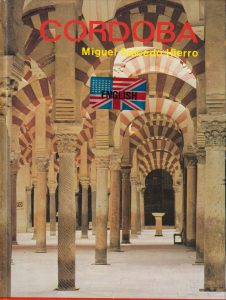
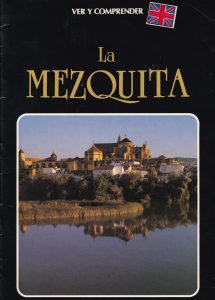
As we walked from pillar to pillar, the thoughts of the glorious Islamic rule came to mind again and again. Here we were, two Muslims, in one of the largest and most beautiful Masjids of the world, but alas there was no Muazzin to call out the Adhān.
As we moved towards the central part of the Masjid, what we saw next was heartbreaking to say the least. A very small area in the centre of the Masjid was converted into a cathedral, a very distressing and disturbing sight indeed. A choir was busy singing the praises of their Lord, and the sound of the piano was echoing all around. Truly a sad, sad, depressing sight.
For the next few hours, we were both lost in deep thought, hardly speaking with each other, for this was the first time that either of us had come across such a sight. We had heard about the conversion of the Masjid (or part of) into a Church or Cathedral, and were warned of what to expect, but being there in person was just a bit too much for both of us. Our hearts were crying, and deep down we just could not bear the sight of what we were witnessing.
As it came towards early afternoon, it was closing time for the morning session and as we were leaving the Masjid the kiosk attendant didn’t look too happy when he saw us with our topis on but, as we were leaving, there wasn’t much he could do.
We returned back to our Masjid in the park and after praying Ẓuhr Ṣalāh, some Arab brothers invited us to eat with them. They had made special preparations for us and their hospitality truly touched our hearts. We spoke about our visit to the Mezquita, and the history of Muslims in Spain.
We decided to go back to the Mezquita in the afternoon and spend more time there. As we approached the entrance kiosk to buy tickets, the same attendant asked us to remove our topis again. However, this time he signalled to us to hand our topis to him and collect them on the way out. We requested him with sign language that we will put them in our pockets, but he was not having any of it. That was it, we decided to challenge him.
We told him in plain, simple English that this is a Masjid and under no circumstances are we going to give you our caps. He retaliated by saying that he will not allow us into the Masjid. We said to him ‘fine, no problem, we have already toured the whole Masjid in the morning and it’s not necessary to go in again, but under no circumstances whatsoever are we going to bow down so much to you and give you our topis’. There was a standstill, he didn’t budge and neither did we.
We spent some of the afternoon in the vast courtyards of the Masjid and then crossed over the road, towards the bridge opposite the Masjid, under which there was a river flowing by. For the next 2 hours, we sat on the bridge, looking at the Masjid. It was a sad sight and we decided to return back to our Masjid in the park.
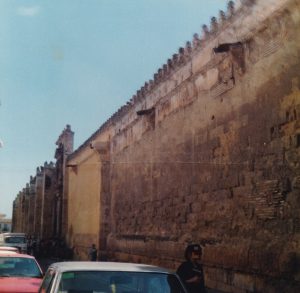
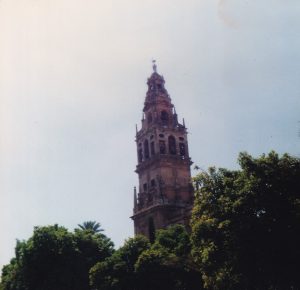
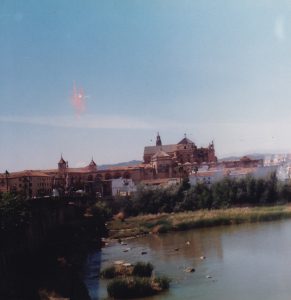
In the evening, we were hosted by one of the brothers and I recall him telling us that the house he was living in belonged to Muslims some hundreds of years ago. As we had to leave Córdoba very early the next morning, the Muazzin of the Masjid decided to spend the night with us in the Masjid.
It was a good job he was there, as around midnight, there was a loud knock on the door. When the Muazzin went to answer, there was a Muslim brother with a non-Muslim standing at the door. The latter wanted to revert to Islām, سُبْحَانَ الله. We all got together, and after a little explanation, the Shahādah was pronounced, and this brother joined the fold of Islām, اللّٰهُ أَكْبَر.
We got up very early the next morning, took the early morning train to Seville, and by 9am, we were standing at the spot where our coach driver had dropped us off some 36 hours earlier. It was a long wait; we had been told that the coach would arrive at 10am and at midday, we were still waiting. Just as we were about to lose hope, the coach turned up and soon, we were back on our way to Lisbon.
We arrived back in Lisbon in the evening, and a few days later, left Portugal for a flight back to the UK.